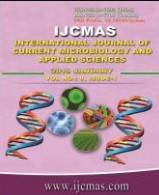


 National Academy of Agricultural Sciences (NAAS)
National Academy of Agricultural Sciences (NAAS)

|
PRINT ISSN : 2319-7692
Online ISSN : 2319-7706 Issues : 12 per year Publisher : Excellent Publishers Email : editorijcmas@gmail.com / submit@ijcmas.com Editor-in-chief: Dr.M.Prakash Index Copernicus ICV 2018: 95.39 NAAS RATING 2020: 5.38 |
With the growing limitation in arable land and water resources, the development of agriculture sector is only possible by increasing resources use efficiency with the minimum damage to agro ecology through effective use of modern technologies. Among these, nano technology has the potential to revolutionize agriculture system. An investigation was initiated to examine the effect of nano scale zinc oxide particle on plant growth and development. In view of the widespread cultivation of ragi in India and other parts of the globe and view of the potential influence of zinc on its growth, this crop was chosen as the model system. A pot culture experiment was conducted during Rabi 2016-2017 with the foliar application of nano scale zinc oxide particle at lower rate dose compared to the chelated zinc sulphate recommended and we recorded higher grain yield (9.60 g plant-1) and straw yield (15.87 g plant-1) in T7 which receive nano ZnO @ 500 ppm ha-1 as foliar spray respectively, compared to chelated zinc sulphate. The inhibitory effect with the higher dose nano particle concentration (nano ZnO @ 1250 ppm) reveals the need for judicious usage of this particle in such application, this study show that the use of nano fertilizers causes an increase in nutrient use efficiency, reduces soil toxicity associated with over dosage and reduces the frequency of the application. Hence nanotechnology a high potential for achieving sustainable agriculture, especially in developing countries.
 |
 |
 |
 |
 |